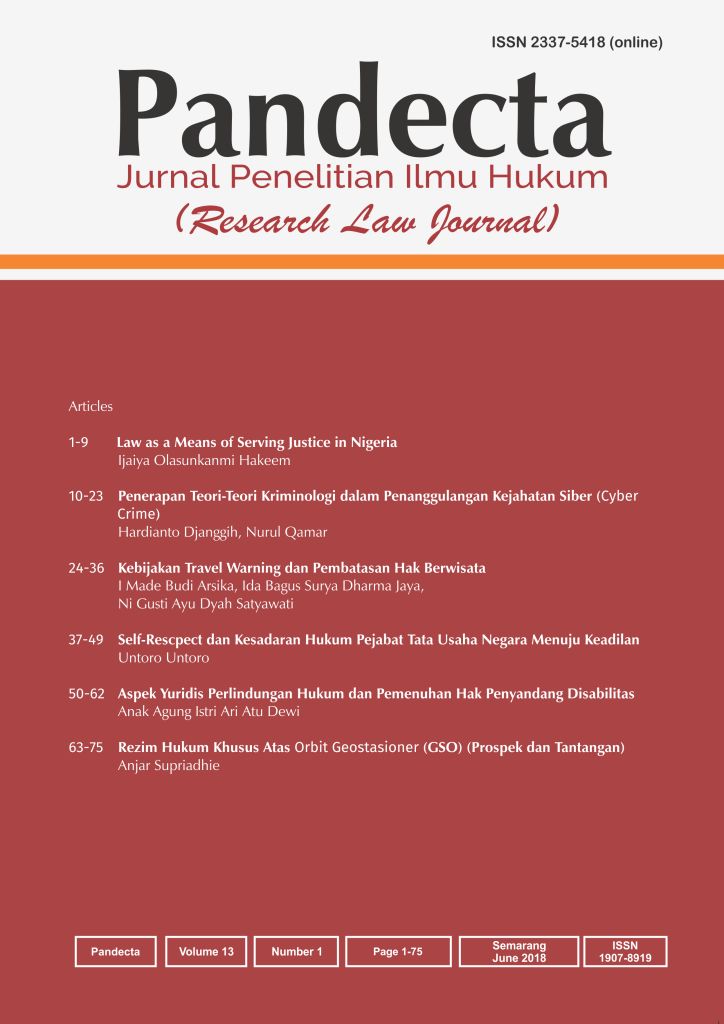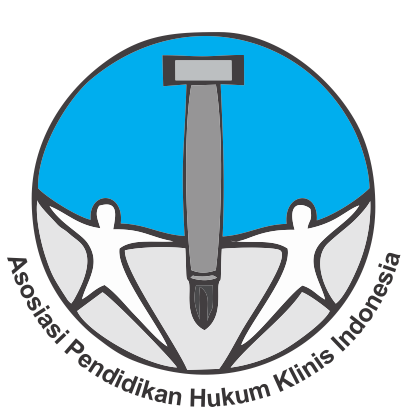Model for Ulayat Land Dispute Resolution Based on Participatory Justice in the Era of Sustainable Development
(1) Universitas Semarang
(2) Universitas Semarang
Abstract
Keywords
Full Text:
PDFReferences
Amran, Ali. “Penyelesaian Sengketa Tanah Ulayat Melalui Lembaga Adat Di Minagkabau Sumatera Barat.” ADHAPER: Jurnal Hukum Acara Perdata 3, no. 2 (2017): 175–189.
Carroll, Stephanie Russo, Randall Akee, Pyrou Chung, Donna Cormack, Tahu Kukutai, Raymond Lovett, Michele Suina, and Robyn K. Rowe. “Indigenous Peoples’ Data During COVID-19: From External to Internal.” Frontiers in Sociology 6 (March 29, 2021): 617895.
Emanuel, Victor. “Perlindungan Hukum Atas Tanah Adat Dalam Kaitan Dengan Pemberian Izin Usaha Perkebunan Kelapa Sawit Di Kecamatan Serawai Kabupaten Sintan.” Perahu 5, no. 2 (2017): 73–80.
Fabre, Cécile. “Constitutional Social Rights and Democracy.” Social Rights Under the Constitution 6 (2003): 110–151.
Gilbert, Jérémie. Indigenous Peoples’ Land Rights under International Law: From Victims to Actors. Brill Nijhoff, 2016.
Gilbert, Jeremie. “Land Rights as Human Rights: The Case for A Specific Right to Land.” International Journal on Human Rights 18, no. February (2013): 115–135.
Ginting, Darwin. “Politik Hukum Agraria Terhadap Hak Ulayat Masyarakat Hukum Adat Di Indonesia.” Jurnal Hukum & Pembangunan 42, no. 1 (2012): 29.
Guimei, B. “The International Covenant on Civil and Political Rights and the Chinese Law on the Protection of the Rights of Minority Nationalities.” Chinese Journal of International Law 3, no. 2 (January 1, 2004): 441–470.
Heriani, Istiana. “Implikasi Pencabutan Hak Atas Tanah Terhadap Perlindungan Hak Asasi Manusia.” AL’Adl 64, no. 2 (2015): 14–20.
John, Locke. “An Essay Concerning the True Original Extent and End of Civil Government.” Great Book of Western World (1992).
Karlsson, Bengt T., and T.B. Subba, eds. Indigeneity In India. 0 ed. Routledge, 2013. Accessed November 11, 2021. https://www.taylorfrancis.com/books/9781136219221.
Liebenberg, Sandra. “Participatory Justice in Social Rights Adjudication.” Human Rights Law Review 18, no. 4 (2018): 623–649.
———. “The Value of Human Dignity in Interpreting Socio-Economic Rights.” South African Journal on Human Rights 21, no. 1 (2005): 1–31.
Málovics, György, Remus Creţan, Boglárka Méreine-Berki, and Janka Tóth. “Socio-Environmental Justice, Participatory Development, and Empowerment of Segregated Urban Roma: Lessons from Szeged, Hungary.” Cities 91 (2019): 137–145.
Maramis, Marhcel R. “Kajian Atas Perlindungan Hukum Hak Ulayat Dalam Perspektif Hak Asasi Manusia” XXI, no. 4 (2013): 98–110.
Nababan, Abdon, and S Sampurna. Perlindungan Masyarakat Adat: Refleksi Kritis Untuk Hari Esok. Palangkaraya: Aliansi Masyarakat Adat Nusantara, Wilayah Kalimantan Tengah, 2013.
Nolan, Aoife, Nicholas J. Lusiani, and Christfian Courtis. “Two Steps Forward, No Steps Back? Evolving Criteria on the Prohibition of Retrogression in Economic and Social Rights.” In Economic and Social Rights After the Global Financial Crisis, 121–145, 2014.
Nugroho, Bambang Daru. Hukum Adat Hak Menguasai Negara Atas Sumber Daya Alam Kehutanan Dan Perlindungan Terhadap Masyarakat Hukum Adat. Bandung: Refika Aditama, 2015.
Nurhidayati. “Penyelesaian Sengketa Tanah Ulayat Kaum Menurut Hukum Adat Minangkabau (Studi Kasus Di Nagari Sungai Nanam Kabupaten Solok).” Universitas Bung Hatta, 2020.
Pentassuglia, Gaetano. “Towards a Jurisprudential Articulation of Indigenous Land Rights.” European Journal of International Law 22, no. 1 (2011): 165–202.
Rodríguez-Garavito, César. “Empowered Participatory Jurisprudence: Experimentation, Deliberation and Norms in Socioeconomic Rights Adjudication.” In The Future of Economic and Social Rights, 233–258, 2019.
Utomo, Laksanto. Hukum Adat. 2nd ed. Jakarta: Raja Grafindo Persada, 2017.
Wickeri, Elisabeth, and Anil Kalhan. “Land Rights Issues in International Human Rights Law.” Malaysian Journal on Human Rights 4, no. 10 (2010): 16–25.
Refbacks
- There are currently no refbacks.


